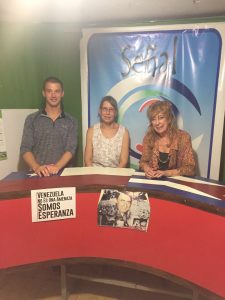J-Term Practica, 2016
Language: Another Means of Racism
March 3, 2016

Can there be a link between the language someone speaks and racism? That is something I never thought much about until I had a conversation with Samuel. It was our first full day in Temuco, the heart of traditional Mapuche territory, and I was curious about not hearing much Mapudungun, the native language of the Mapuche people. He told me that he knows several words of Mapudungun but nothing more. He grew up knowing that he was supposed to speak Spanish and not Mapudungun like his grandparents. Even though he would have liked to learn the native language of his ancestors, he was always told that Spanish was better.
Traveling to Chile as part of the 2016 “Transitional (In) Justice” course, I was expecting to learn about injustices carried out in the country stemming from the Pinochet dictatorship which ended in 1990. The Mapuche people face discrimination and racism from nearly every angle of society. The Mapuche are indigenous inhabitants who live primarily in south-central Chile and southwestern Argentina. They are a strong people and are proud of their centuries-long resistance to occupation by winca, or non-Mapuche persons.
While land disputes are the primary struggles for Mapuche livelihood, I was surprised how language is used as yet another layer of expressing racism by Chilean society towards Mapuche. The issue of Mapudungun and its uses is a complicated one, even within Mapuche society. The Chilean government over the centuries has taken steps to eliminate the Mapudungun language and assimilate Mapuche into a mono-cultural society. The darkest chapter of this was during the dictatorship (1973-1990) when it was illegal to speak or teach Mapudungun with severe consequences for violators. During this time, families like Samuel’s did not teach their children Mapudungun for their own safety, especially in urban areas. They often went further to adjust their appearance (dying hair and applying make-up) to appear whiter and hopefully avoid further discrimination due to their indigenous race. This period was quite damaging to the survival of Mapudungun. It created a generation with hardly any Mapudungun speakers. Only in recent years have there been efforts to teach Mapudungun to a new generation of youth. The government extended limited efforts to foster Mapudungun language instruction in some schools via policies of Intercultural Bilingual Education. But these efforts have seemed half-hearted and the programs have challenges with funding, training, and political support.
Furthermore, I was surprised by the debate over the use of Mapudungun within Mapuche society. There is not a unified front on how Mapudungun should be utilized in Mapuche communities. Some want to send their children to bilingual schools and some do not. Some want to institutionalize Mapudungun and others do not. Some prefer to offer it only as a language course in secondary schools like that of English or French. In 2006 Microsoft created a Mapudungun translation of their operating system. Upon hearing this, I thought that Mapuche would have been happy to have this as a way to foster and teach the use of their language. However, this caused division among Mapuche leaders. Many felt they would lose control of how their language is used. This struggle hits at the cornerstone of the debate of Mapudungun usage today. Mapudugun is historically an oral language. It has been put in writing using several alphabets, including the Latin alphabet. But nothing has become standard. With several different alphabets to choose from, there is little consensus among Mapuche leaders, linguists, and many others in the publication of the language which alphabet should be the standard.
All of this got me to reflect about my own experience with language and the role it has played in my life. It is easy to take for granted the fact that my native language is one that is dominant in the world and a sought-after asset. In addition, I have had the opportunity to learn other languages that are also “big” languages in the world. Learning what the Mapuche people have gone through in terms of their language over the decades gave me a new perspective on the role of language. Just like in other former colonial countries, Chile implemented Spanish as the language of administration, government, and education. This gave a more favorable status to Spanish speakers and further entrenched social class divisions. It became yet another tool to discriminate against indigenous persons. This discrimination continues to this day and has put into question the future of the Mapudungun language. I see how the decisions about language made over the years by political leaders, policy makers, educational institutions, and businesses have shaped the attitudes and patterns of language use and turned language into a mechanism to express racial discrimination.
This was my experience with language among the Mapuche in Chile. The language issue is just one facet of structural violence against them. The experience gave me a fresh pair of eyes to examine racism of indigenous people here at home and abroad. Indigenous groups around the world struggle to practice their own culture in the way they see fit. They have the system against them in maintaining their identity, of which language is just one aspect. As for Samuel, I find it uplifting to meet young people who not only embrace who they are but strive to gain what has been lost.



You must be logged in to post a comment.